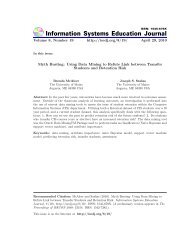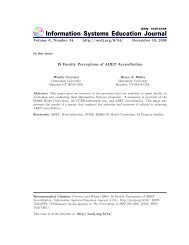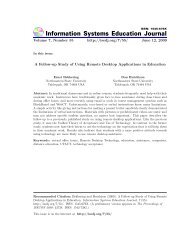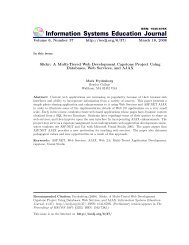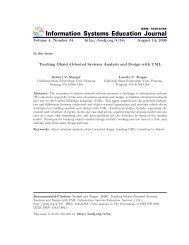Teaching Relational Algebra and Relational Calculus: A ...
Teaching Relational Algebra and Relational Calculus: A ...
Teaching Relational Algebra and Relational Calculus: A ...
Create successful ePaper yourself
Turn your PDF publications into a flip-book with our unique Google optimized e-Paper software.
ISEDJ 6 (9) McMaster, Anderson, <strong>and</strong> Blake 8<br />
volve tables <strong>and</strong> three involve attributes.<br />
Since all parts of the expression are connected<br />
by <strong>and</strong>, the QUERY1 predicate is true<br />
only when all parts are true.<br />
Prolog is a complex language with many features.<br />
Students require only a small part of<br />
Prolog to write RC queries. All they need is<br />
the ability to define predicates--one for each<br />
table using facts, <strong>and</strong> one for each query<br />
using rules.<br />
Appendix B describes a database project<br />
that will give students practice in writing <strong>and</strong><br />
running RC query programs.<br />
5. SUMMARY AND CONCLUSIONS<br />
This paper has emphasized the importance<br />
of teaching RA <strong>and</strong> RC as query languages in<br />
database courses. These languages should<br />
be taught in environments that allow query<br />
programs to be compiled <strong>and</strong> run.<br />
Instead of using the usual mathematical notation<br />
for RA operations, we have created a<br />
function library in Visual FoxPro to perform<br />
RA queries. We have also shown how to use<br />
Turbo Prolog to express RC queries in a nonprocedural<br />
form. Prolog is used because it<br />
implements the first-order predicate calculus<br />
that is the basis for RC. Sample query programs<br />
have been demonstrated in both the<br />
FoxPro <strong>and</strong> Prolog environments.<br />
We have taught database courses for several<br />
years that use this programming approach in<br />
teaching RA <strong>and</strong> RC. Course evaluations<br />
indicate that most students enjoy having<br />
programming projects in the database<br />
course, including projects for RA <strong>and</strong> RC.<br />
We have yet to hear a student say that<br />
she/he prefers mathematical representations<br />
for these query languages.<br />
The heart of Information Systems is software<br />
<strong>and</strong> data. Programming can provide a<br />
valuable learning tool throughout the database<br />
course, not just for SQL. Using this<br />
approach, students can learn RA <strong>and</strong> RC the<br />
same way they learn other computing concepts--by<br />
writing programs <strong>and</strong> watching<br />
them run.<br />
6. REFERENCES<br />
Codd, E. F., "A <strong>Relational</strong> Model of Data for<br />
Large Shared Data Banks." Communications<br />
of the ACM, June, 1970.<br />
Connolly, Thomas <strong>and</strong> Begg, Carolyn, Database<br />
Systems: A Practical Approach to Design,<br />
Implementation, <strong>and</strong> Management<br />
(4th ed). Harlow, Engl<strong>and</strong>: Addison-<br />
Wesley, 2005.<br />
Darwen, Hugh, <strong>and</strong> Date, C. J., "On the <strong>Relational</strong><br />
<strong>Algebra</strong> vs. <strong>Calculus</strong>."<br />
www.dbdebunk.com, 2005.<br />
Date, C. J., An Introduction to Database<br />
Systems (8th ed). Addison-Wesley, Boston,<br />
MA, 2004.<br />
Dijkstra, Edgar, "On the Cruelty of Really<br />
<strong>Teaching</strong> Computer Science." Austin, TX,<br />
1988.<br />
Elmasri, Ramez, <strong>and</strong> Shamkant Navathe,<br />
Fundamentals of Database Systems (4th<br />
ed). Addison-Wesley, Boston, MA, 2004.<br />
Leyton, Richard, "LEAP RDBMS: An Educational<br />
<strong>Relational</strong> Database Management<br />
System." leap.sourceforge.net, 2005.<br />
Robbert, Mary Ann, <strong>and</strong> Ricardo, Catherine<br />
M., "Trends in the Evolution of the Database<br />
Curriculum." ITiCSE 2003.<br />
Silberschatz, Abraham, et al, Database System<br />
Concepts (5th ed). New York:<br />
McGraw Hill, 2005.<br />
c○ 2008 EDSIG http://isedj.org/6/9/ February 7, 2008



